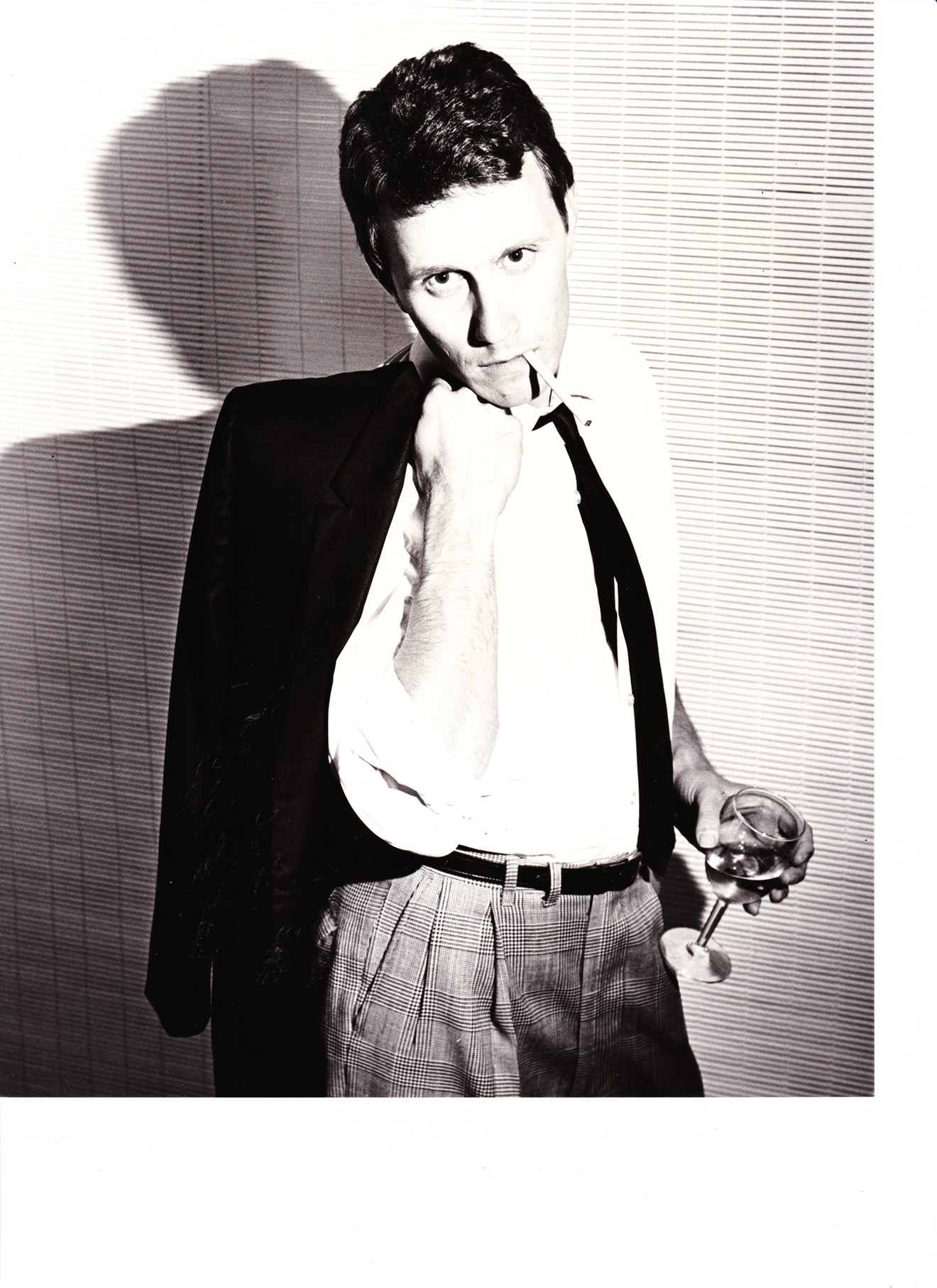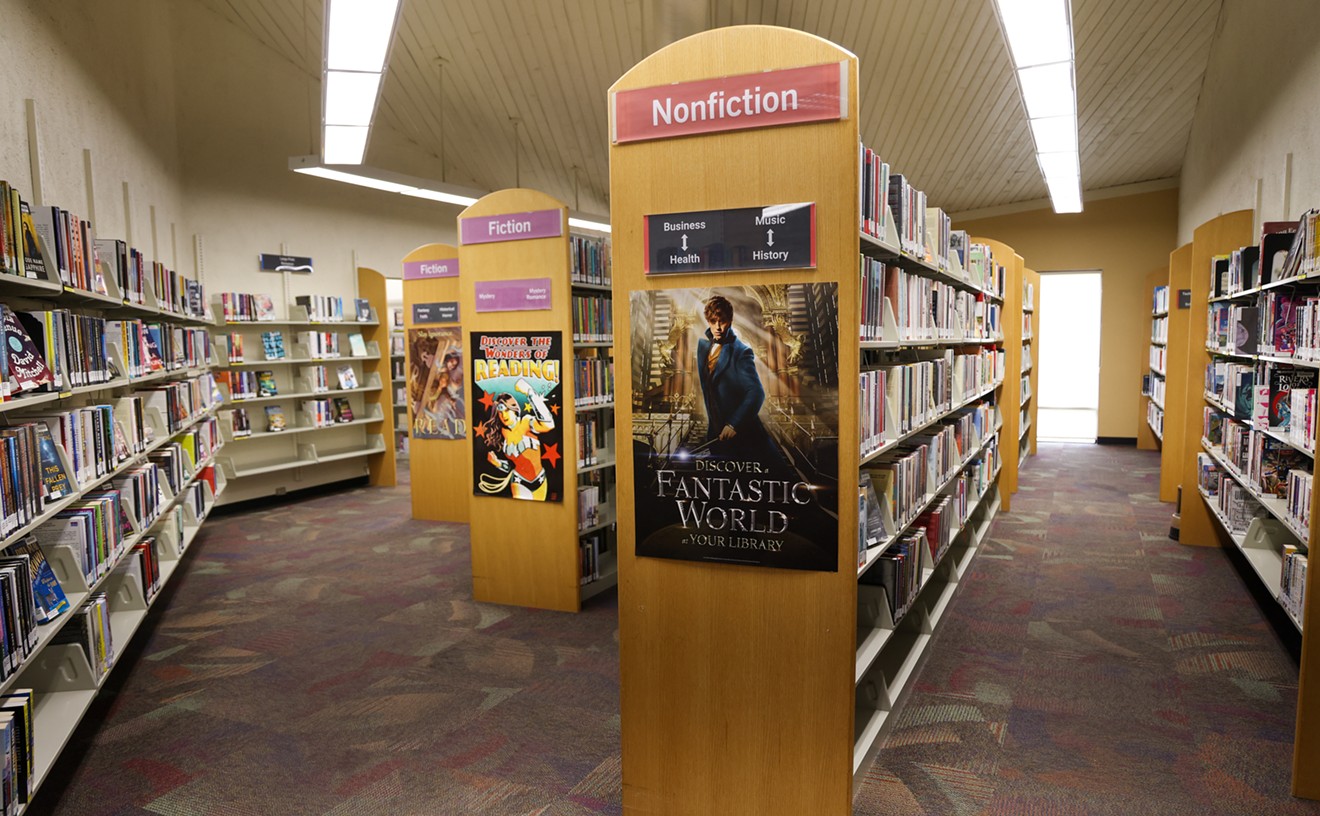Dewey Webb passed on Wednesday morning, April 26, in the midcentury central Phoenix house in which he lived most of his life. He died in a hospice bed in his living room, with posters for Beyond the Valley of the Dolls and Altman’s 3 Women gazing down on him from the walls.
His health had been declining for years, and he’d taken a particular turn for the worse this month, but in the last couple of weeks I began to suspect that he’d been holding on to see the end the TV show he’d been hooked on, Feud: Bette and Joan, the FX miniseries about the grudge between Joan Crawford and Bette Davis, two of Dewey’s great favorites. He’d been pointing out the show’s grave liberties and period inaccuracies throughout its run, which, of course, only enhanced his enjoyment of it. The series finale was on in the room Sunday night, though I don’t know whether he was able to register it by then.
If you read Phoenix New Times in the ’80s and ‘90s, you read Dewey, who was a staff writer throughout those decades. He was the paper’s professional humorist, writing stories on peculiar, outré subjects with a mordant, unpretentious wit — biting one-liners that linked together to keenly playful effect.
But perhaps more significantly than his own bylined articles, Dewey was, not to put too fine a point on it, The Greatest Headline Writer in the History of Journalism. His gift for puns and cultural allusions was without peer. He wrote most of the headlines for the paper during those years, and his contribution to its sophistication and polish would be hard to overstate. I well remember sending him movie reviews, and seeing — within half an hour — a list of six or seven brilliant heads, and the hard part was choosing one at the expense of the others.
In 1998, when I told Dewey I was working on a story about Krista Griffin, who at the time was contemplating giving up her lease on the Valley Art Theatre, he promptly said “The Last Temptation of Krista.” This became the article’s title, and influenced how I structured it.
The persona that Dewey carefully cultivated during those years was of a hard-partying, catty gossip and cranky misanthrope. This wasn’t a false image at all, and when it comes to that side of his life, I’m far from the best person to eulogize him. My square habits meant I wasn’t present for many of the celebrated, Petronius-worthy revels at Chez Nous or Durant’s, and was mostly a wallflower when I was.
I got to know Dewey at the office, when he would pay me the compliment of asking my opinion about stuff he was working on. It was then that I saw what a careful, exacting craftsman he was as a writer, behind the pose of the wisecracking party animal.
We shared many of the same pop-culture enthusiasms, and would go to movies together. Later, along with our friend Dave Gofstein and his neighbor Mike and others, we’d watch bizarre video selections at Dewey’s house, the host constantly interrupting with commentary more entertaining than whatever was onscreen. He dog-sat my Chihuahua, and had my daughter over many times to swim in his pool. He and I even went for pedicures together a couple of times.
After he left New Times in 2001, Dewey did some good writing for other publications, and some PR writing. He did some work as a location scout for the NBA on TBS, suggesting, as few could have done better, offbeat, interesting Valley sights that hadn’t been done to death, to be shown going in and out of commercials.
On the whole, he was underemployed. But he cared for his father in his last years, and he adopted a beagle, and he traveled, and he wrote punishingly funny essays which no amount of cajoling could induce him to share beyond a few friends on his e-mail list.
Anyone who knew Dewey well knows that he could be difficult. He was a reflexively skeptical “debunker” of any sort of received wisdom — probably why he thrived at New Times for so long — yet was gullible enough to be taken advantage of at times. His constantly spinning mind made it hard to get him to focus on his own best interests, and his caustic side left him with some alienated enemies, not all of whom, as he would certainly admit, were unjustified in their offense.
But far more people would attest to Dewey’s kindness and generosity and, just around the corner from the snide banter, his sweetness. I’m one of them; I’m deeply grateful to have worked with him, and to have been friends with him.
Safe travel, pal. This world, and especially this town you loved so much, is a poorer place without that braying laugh of yours, audible all the way down the hall.
Dewey Webb (1952-2017) is survived by a sister, Barbara Dearing (John); a brother, David Webb; a niece, Erica Webb; nephews, David Dearing (Janice) and Andrew Dearing (Lindsay Lipton); and a grandnephew, Nolan Dearing.
He won countless awards for his writing and headlines — and, most famously, he was a Wheel of Fortune winner in 1984.
In lieu of flowers, donations can be made to Hospice of the West.
[
{
"name": "Air - MediumRectangle - Inline Content - Mobile Display Size",
"component": "18478561",
"insertPoint": "2",
"requiredCountToDisplay": "2"
},{
"name": "Editor Picks",
"component": "16759093",
"insertPoint": "4",
"requiredCountToDisplay": "1"
},{
"name": "Inline Links",
"component": "17980324",
"insertPoint": "8th",
"startingPoint": 8,
"requiredCountToDisplay": "7",
"maxInsertions": 25
},{
"name": "Air - MediumRectangle - Combo - Inline Content",
"component": "16759092",
"insertPoint": "8th",
"startingPoint": 8,
"requiredCountToDisplay": "7",
"maxInsertions": 25
},{
"name": "Inline Links",
"component": "17980324",
"insertPoint": "8th",
"startingPoint": 12,
"requiredCountToDisplay": "11",
"maxInsertions": 24
},{
"name": "Air - Leaderboard Tower - Combo - Inline Content",
"component": "16759094",
"insertPoint": "8th",
"startingPoint": 12,
"requiredCountToDisplay": "11",
"maxInsertions": 24
}
]











